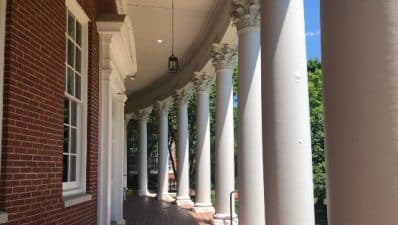Large majorities of Virginians have concerns about how mandatory testing is impacting students and teachers in the classroom but also think Standards of Learning tests help with school accountability and academic standards, according to a new Commonwealth Poll released this week by Virginia Commonwealth University’s Commonwealth Educational Policy Institute.

Even with those benefits, Virginians see testing having negative effects in the classroom. Three-in-four respondents (75 percent) strongly or somewhat agree that preparing for SOLs means teachers can’t cover all the important material needed, with 55 percent strongly agreeing with the statement. The percentage of respondents that strongly agree has increased 10 percent (from 45 percent to 55 percent) since 2002, the last time the question was asked. A large majority also thinks that SOLs are putting too much pressure on students, with 63 percent strongly or somewhat agreeing.
One proposed benefit to testing is increasing student performance. However, when asked, a large majority of respondents said that increased testing made no difference (33 percent) or hurt (35 percent) student performance. The percentage of respondents who indicated that testing hurts performance has increased 9 percent since the last time the question was asked in 2007-08. Respondents were also asked how much they agreed with the statement, “SOLs improve student achievement.” A majority (54 percent) strongly or somewhat disagreed. The percentage of respondents that disagreed has increased by 16 percent since 2002, the last time the question was asked.
“While SOLs are still seen as helping with accountability and standards, over time the numbers of Virginians with concerns about how mandatory testing negatively affects students, teachers and performance is increasing,” said William C. Bosher, Jr., Ed.D., executive director, Commonwealth Educational Policy Institute and distinguished professor of public policy in the Wilder School of Government and Public Affairs at VCU. “With regard to local school options, the public remains supportive of providing local school divisions with greater options for how they do business.”
Minorities and those with lower levels of education or income were more likely to think testing has benefits for students. Thirty-nine percent of minorities said that increased testing has helped student performance, while only 17 percent of whites said the same. Minorities were also more likely to agree that SOLs improve student achievement. A majority of 55 percent strongly or somewhat agreed with the statement, compared to 37 percent of whites.
There were also significant differences by gender, with women being more likely to see the negative effects that SOL tests have in the classroom. Seven in 10 women strongly or somewhat agreed that SOL tests are putting too much pressure on students, compared to 56 percent of men. Women were also more likely to think that SOL preparation negatively impacts teachers’ ability to cover all the important material in the classroom. A solid majority of women (60 percent) strongly agreed with the statement. Only 49 percent of men felt the same.
“It is interesting to see that minorities were more likely to view SOLs as helping achievement and performance, while women were more likely to see the negative effects on teachers and students in the classroom,” said Farrah Stone Graham, Ph.D., assistant professor in the L. Douglas Wilder School of Government and Public Affairs and director of the survey.
When asked about how to address schools that consistently fail to meet testing standards, a majority (53 percent) opposed the idea of those schools being taken over by another entity. However, one region, south central Virginia, had a majority of respondents (53 percent) who favored the strategy.
More than seven in 10 respondents (72 percent) favored allowing students who are homeschooled to participate on local public school sport teams and 63 percent favored allowing localities to have the option to start the public school calendar before Labor Day, marking a 5 percent decrease from last year. There were regional differences on the issue of homeschooler participation in public school sports; however, all had majority support. The south central region was the most supportive with 81 percent, and the northwest was the least supportive of the option, with 66 percent. Parents of public school students were much more evenly split on the issue of changing the school calendar, with 40 percent opposing the idea, compared with 28 percent of those who don’t have children in public schools.
When respondents were asked to select which type of school they thought would provide the best education, 51 percent indicated public school as their choice. Almost one-third (32 percent) said private school. A much smaller percentage indicated a charter school (8 percent), home school (6 percent) and virtual school (1 percent). Public school employees and retirees and minorities were more likely to choose public school with 60 percent and 57 percent, respectively, indicating the option.
The Commonwealth Education Poll was conducted by landline and cell telephone from Dec. 27, 2013, to Jan. 3, 2014, with a random sample of 803 adults in Virginia. The margin of error for the poll is plus or minus 4.5 percentage points. This poll is conducted annually by VCU’s Commonwealth Educational Policy Institute (CEPI).
For a PDF of the 22-page report, including complete question wording and detailed tables of results, seehttp://www.cepi.vcu.edu/publications/polls/.










